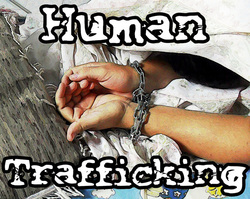| Examine the news stories nationwide about human trafficking — plenty of them exist and new ones pop up each day — and you soon detect a theme. The journalists who write these stories feel obligated to let people know the problem is real, and that it happens in their readers’ neighborhoods. They think you are inclined to disbelief, and you are. |
| | The antebellum South may have disappeared at Appomattox, but the modern version is, in some ways, worse. It’s largely invisible, made all the more difficult to find because of ignorance. That’s true in Utah, as well. New cases of what can accurately be only called slavery surface constantly. One made the news again this week, involving a prostitution ring. Some cases take place in suburban neighborhoods people consider safe or boring. Recruiters — young people who themselves were forced into slavery but who are deemed trustworthy by their masters — are on the lookout in places where teenagers congregate. They don’t snatch them like third-rate kidnappers. They groom them, preying on insecurities or the difficult relationships kids have with their parents. Recruiters come across as friends and confidants, hoping that, over time, the kids will come voluntarily. Russell Smith, section director for the SECURE (Statewide Enforcement of Crimes by Undocumented Residents) strike force describes what these recruiters seek. “Let’s say there is a group of girls,” he said. “The one who is kind of withdrawn and who doesn’t say much, that’s who they want. Not the leader.” But this kind of forced prostitution is only part of a picture that gradually is beginning to come into focus for state law enforcement officials. Late last week I sat down with three key members of Utah’s effort against modern slavery — Smith, Greg Ferbarche, director of the Attorney General’s criminal justice division and Dan Strong, a state prosecutor assigned full-time to human trafficking. Thanks to a $1.2 million grant from the Department of Justice, they are part of a renewed effort to prosecute such crimes and take proper care of the victims. They describe a multi-pronged, complicated array of human-trafficking situations in which victims often are mistaken for criminals and perpetrators are masters at exploiting vulnerabilities with threats. It isn’t all about sex. Some people south of the border are lured here by the promise of jobs, then forced into unpaid labor. Their captors threaten them with deportation if they try to leave. Some even have valid work visas their overlords take from them. Such was the case two years ago with Victor Manuel Rax, a Guatemalan who allegedly used teenage boys against their will to sell drugs. Sometimes, it involves adult women who, desperate for money, agree to work as prostitutes for pimps who take all the money and won’t let them leave. Smith describes one such woman with two children who met a man offering to take care of them all. When, after a few encounters with customers, she told him she wasn’t cut out for such work, he grabbed her by the throat, rammed her against a wall and told her he now owned her and her children. If she ever wanted to see her children again, she was told, she would do as he said. Often, the slaves are arrested. Their masters promise to pay all fines in return for silence. But from then on the masters constantly remind the victims they have criminal records and won’t ever be trusted again in the real world. Others are kept in bondage by the promise of drugs or through other fears. And, for the traffickers, a sex-saturated culture is their best friend. “The public says what’s wrong with two people agreeing to have sex?” Smith said. “But it’s not an even exchange. It’s not a contract.” And it wouldn’t happen without willing customers, many who are wealthy residents of quiet suburbs happy to pay $200 or $300 for an encounter. The Walk Free Foundation, based in Australia, estimates the world’s slave population at 30 million today, of which about 60,000 live in the United States. That may shock people who thought it all ended with the Civil War. Modern slave traders count on it. |


 RSS Feed
RSS Feed

